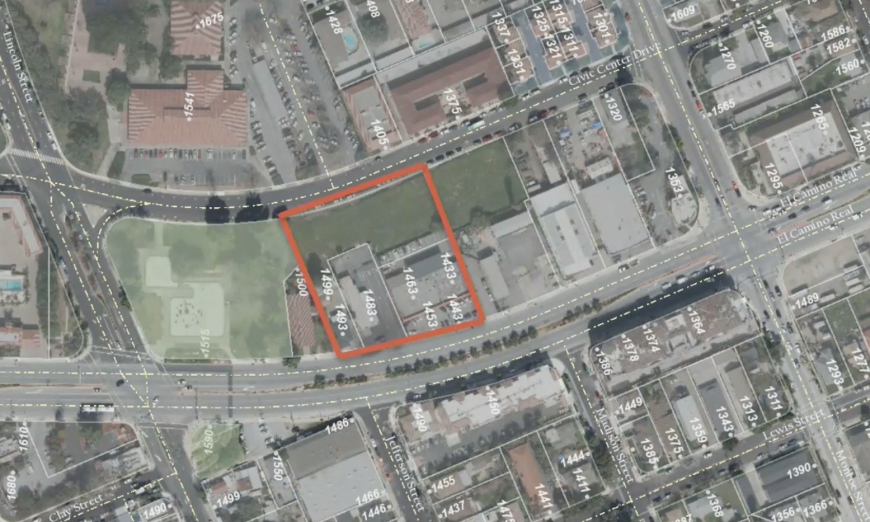At their May 22 meeting, Planning Commissioners deliberated on an application for a use permit for a 190-room hotel at 2900 Lakeside Drive at the intersection with Tannery Way. The application also included a permit for the sale of alcohol on the premises as well as a live music permit, however because the permit request for the live music wasn’t included in the public notice for the project, the request was ultimately removed.
The project includes a shuttle service to San Jose Airport, 151 parking spaces including bike parking, shared-ride spaces and spots for electric vehicle charging. City staff recommended the project for approval with the understanding that it still needed to be heard by the architectural review body. However, the project failed to move forward at the meeting as commissioners were largely in agreement that the architectural design was too plain and utilitarian.
Planning Commission Chair Sudhanshu Jain noted that since the project would be visible from Highway 101 that the City needs a “signature building” and not something of low architectural quality. He also called for the addition of solar panels on a canopy above parking and for LEED Silver certification.
The applicant admitted that the location makes it a “gateway property” and promised that the development team will work on a design that’s more acceptable. Regarding the solar panels, the developer said that they will pose an economic challenge. The construction contractor will be consulted regarding the feasibility of LEED Silver certification.
Commissioners voted to continue decision-making about the project to the June 12 meeting when it’s expected that the exterior design of the hotel building will be updated.
Catalina II
Right across the street from Catalina I, a residential project that was approved last year and is under construction — a proposal for Catalina II was heard by Commissioners. The project consists of 39 townhomes, seven of which would be live-work units, located at 1433 to 1493 El Camino Real. The 1.70-acre site currently has vacant buildings that were formerly automotive commercial buildings and a single family home. The project requires a rezoning to Planned Development to allow for townhomes.
Plans call for residences with a modern cottage farmhouse design, and would include enclosed front patios and two-car garages, some detached. Each unit will have three bedrooms, three and a half baths, three stories and a “bonus” room, which could be used for a den or game room. Eight visitor spaces will be supplied and the project will also feature 3,048 square feet of recreation space. Free bus passes will be offered to residents to help curb the need for car ownership.
The project, which is located in the El Camino Real Focus Area, was found by staff to be consistent with the General Plan and contains a 10 percent affordable housing component for the townhomes that are all for-sale units.
A representative for the developer described Catalina II as “essentially an extension of Catalina I,” a comment aimed to assuage concerns that the two developments wouldn’t meld aesthetically. One member of the public wrote a letter commenting that the farmhouse design wouldn’t fit into the Spanish-Mission context that prevails on El Camino Real. Others found that the diverse styles will be good for El Camino.
Commissioners were in agreement to recommend the project to City Council under the conditions that an archaeological survey be conducted of the site, and that in lieu of the free bus passes, residents can get a credit for the train or ride share if it’s more appropriate for their situation.
Massage Establishments
City staff outlined changes to the zoning code that deal with the regulation of massage businesses in Santa Clara. Since 2015, local municipalities in California have had the authority to issue land use permits for massage businesses for health and safety reasons. Since that time, Santa Clara has required that such establishments not be located within 500 feet of schools and other sensitive land uses. This has severely limited the places where these businesses can operate, to the point that owners were given an extension until December 2019 to comply.
Since 2018, the Police Department has conducted site visits of 71 businesses where massage is offered and ended up revoking licenses of two establishments. Because it’s been found that criminal activity can occur at or around massage establishments, the City has been trying to come up with regulations that better balance the need for the public to access the health benefits of massage with the safety issues.
The proposal is to change permitting process from the current land use permit to a permit that’s issued by the Police Department. The permitting for massage business would be limited to sites with a minimum of 20 acres of mixed-use or commercial uses and with a minimum of 10,000 square feet of retail. The business can also operate at wellness centers at places of employment that have a minimum of 500 workers. Exterior windows are also required among other stipulations. Staff have identified 10 sites that would qualify under the new requirements and anticipate that more site opportunities will be created as redevelopment continues.
Commissioners agreed to recommend the changes to City Council with the exception that hotels with more than 100 rooms also be allowed to offer massage for patrons.
Other Business
Another amendment to the zoning code was on the agenda because of concerns about the architectural review process. It’s been questioned whether the group of people who approve or deny a project should be the same body that hears an appeal. The debate on this topic became complex during the meeting due to practical considerations about who would sit on the appellate body. The decision about a new ordinance was continued to a Planning Commission meeting scheduled for July 24.
Priya Cherukuru recently joined the Planning Commission. Her terms lasts until June 30, 2023.







